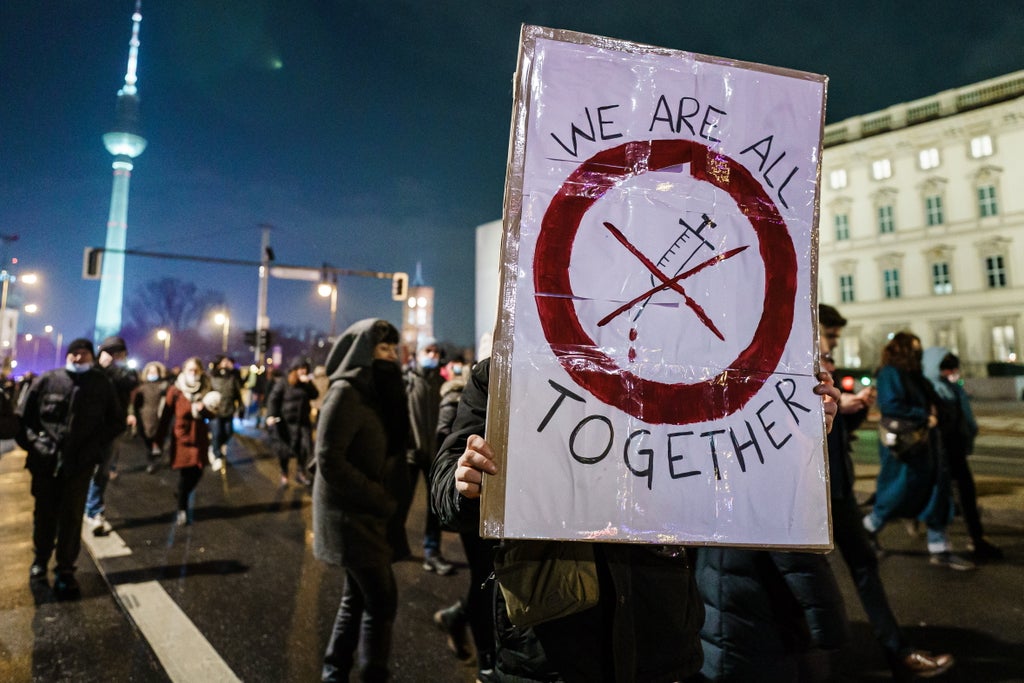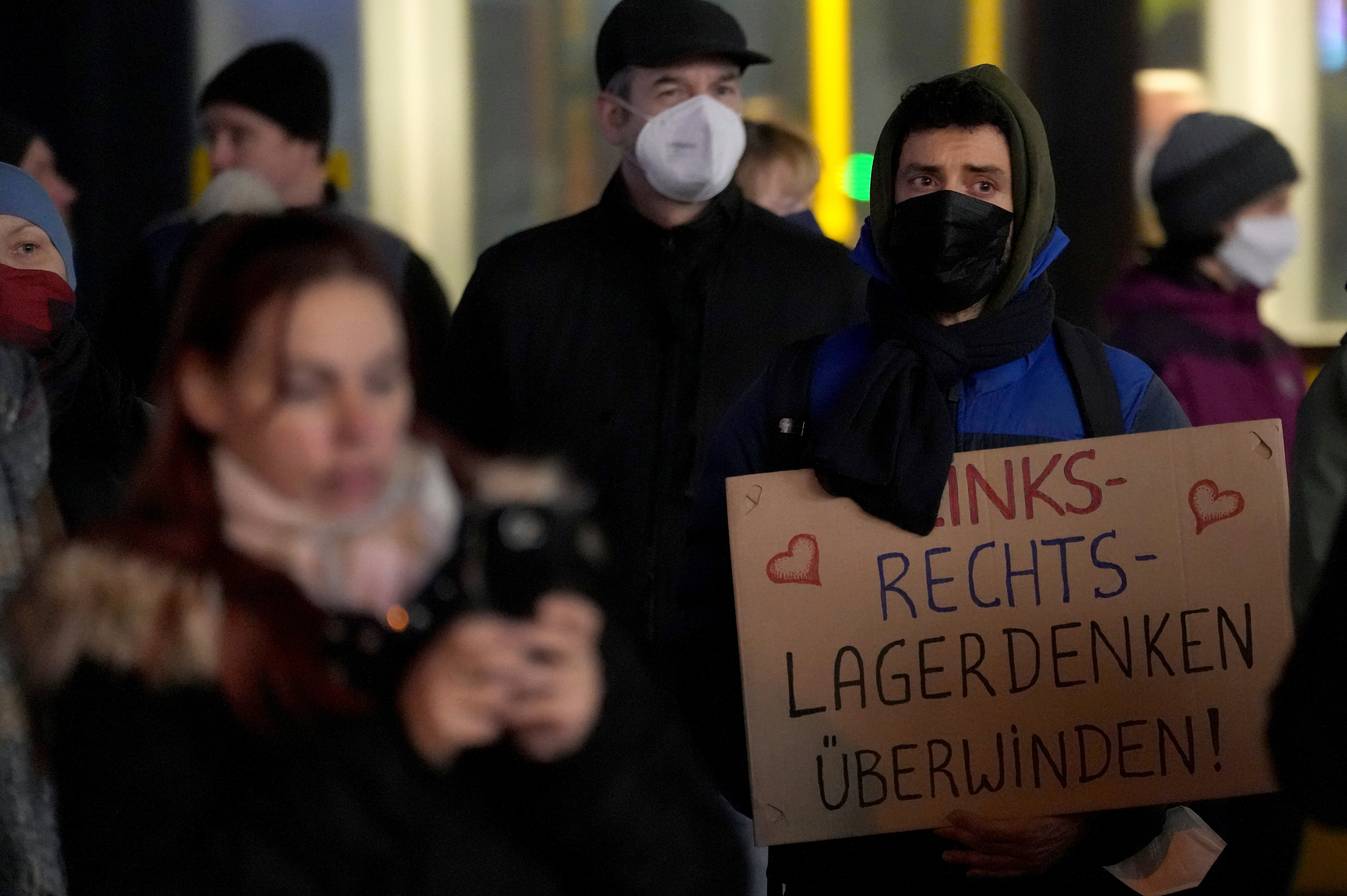
Rock music blared from boom-boxes stacked on a slow-moving van at the front of the parade and the smell of weed filled the air as a spirited crowd of about 1,000 people marched more than six miles through the centre of Berlin to protest against the German government’s corona-fighting measures.
Undeterred by freezing cold temperatures or increasing public pressure to get vaccinated against the virus, some in the eclectic mix who came together again on Monday evening in Berlin said they felt they were on an historic mission to force change with their peaceful weekly protests – just like East Germans did in 1989 with their marches that swept the communist regime from power and helped bring down the Berlin Wall.
The Monday evening protest in Berlin felt less like a revolution and more like a slow-moving happening – a myriad of like-minded people walking, talking and laughing behind the van with the loud music.
The spirit was vaguely reminiscent of Berlin’s world-famous “Love Parade” techno rallies that took place in the late 1990s just a few miles away. But the anti-government banners and occasional vitriolic speech from the van’s loudspeakers attacking a proposed vaccination mandate made the group’s message clear.
“We’re united by our opposition to any government mandate for vaccinations and the oppressive corona restrictions,” said Katrin Hirsch, a 54-year-old who also marched in Leipzig as a student 33 years ago until she was banned from the city and kicked out of the university for taking part in the mass weekly rallies that historians say played a key role bringing down the communist regime, paving the way for German unification.
“I saw first-hand what we were able to accomplish on the streets in Leipzig in 1989 and I’m convinced that pressure from the people out on the streets can lead to change,” added Hirsch, who now manages housing in Berlin and is staunchly opposed to getting vaccinated against corona – along with a quarter of the population.
“The demonstrations in Leipzig grew much faster and there was more energy because we had nothing to lose. The atmosphere now is more relaxed and peaceful. Our goals here are to stop the vaccine mandate, stop forcing us to wear masks, and to put this nightmare behind us.”
German chancellor Olaf Scholz and other political leaders have done an about-face on the vaccination mandate question in recent months, in the wake of surging corona deaths and infections.
After long promising there would be no general “Impfpflicht” (vaccine requirement) to fight corona infections, Scholz and most are now calling for those very mandatory vaccinations – in the hopes of preventing or slowing a fifth wave of infections in the autumn and putting an end to the pandemic.
With vaccine hesitancy running higher in Germany than in other European countries such as France, Spain and Italy, only about 73 per cent of Germans have been vaccinated, far below the government’s target of 90 per cent. A vote on the issue that has bitterly divided Germany is expected in parliament in March or April.
That change of heart on the vaccine mandate question has given protests that have been running quietly for the past two years a fresh injection of supporters and energy.
The numbers taking part in rallies nationwide have risen dramatically in the past month, which has perhaps been one of the reasons that Scholz and his government have retreated slightly from their November vow to have the mandate enacted by February.
More than 115,000 Germans have died from corona infections since the start of the pandemic and the seven-day average number of infections has soared to a record 553 on Tuesday, up from 387 a week ago.
The protesters have deliberately picked Monday evenings for their rallies across Germany. The term “Montagsdemo” has a powerful meaning in Germany, harkening back to the monumental changes that took place following the Monday evening protests in Leipzig in 1989.
There were an estimated 75,000 others who took part in anti-corona marches in hundreds of towns and cities across Germany last Monday evening.
Most were peaceful but there was scattered violence at rallies in Rostock and Cottbus in eastern Germany when police, accompanying the protests there, disbanded the marches because the participants refused to wear their masks. Some of the demonstrators threw pyrotechnics before police used water canon to break up the crowd. Eleven people were arrested in Rostock. In Cottbus, four protesters were arrested after trying to break through a police barrier.
There was no violence in Berlin, even though hundreds of riot police struggled at times to keep rival groups of counter-protestors shouting anti-Nazi slogans separated from the protests. Across Germany somewhat smaller numbers of far-right extremists have used the protests, mingling amongst the anti-vaxxers and others opposed to the restrictions, to vent their opposition to the state.

In Berlin, there was also a brief stop outside the offices of ZDF public broadcasting station,. where speakers attacked the network’s coverage of the Covid crisis as unbalanced and insufficiently critical of the government – one speaker went so far to compare ZDF’s news coverage to the “Gleichschaltung” of the media that took place under Adolf Hitler when the Nazi party established a system of totalitarian control over all aspects of society.
“I don’t know if these peaceful protests against the corona measures will make a difference at all,” said Bert Müller, a 50-year-old former firefighter who was walking with his bicycle in the crowd and has taken part a dozen times. “But I do know that if I were sitting at home on the sofa nothing will change. So that’s why I’m here. Hoping for change.”
Several said they enjoyed coming to the rallies to meet like-minded people and forget the growing pressures from the public, their families and their employers to get vaccinated or wear masks everywhere. One athletic-looking man in his early fifties admitted that, when bars and clubs are closed, the rallies are a good place to meet women. “Where else can you go in the evenings to meet anyone in the these days?” the paramedic said.
In Berlin, the local government tightened rules on Sunday and now requires patrons of restaurants, cafes and theatres to be fully vaccinated and have received a third booster shot before entering their premises.
“You can feel our collective power out here on the streets,” said Sabine Mylonas, a 58-year-old healthcare worker who does not want to get vaccinated.
“You can feel really isolated these days. People tell you that you’re crazy not to get vaccinated, that it’s so dangerous and you’re all going to die. Those are people who don’t question anything and believe everything they read in the mainstream media. So you end up feeling very lonely. But then you come here and you can talk with people who think like you and it makes you feel better for a few hours.”







